

Australian museum buys 1 holey dollar for $130,000. The National Museum of Australia spent AUS$130,000 (hammer price AUS$111,000) to acquire a rare 1813 “holey dollar,” Australia’s first official minted currency, at the International Auction Galleries’ Australian & World Rare Coin auction on November 6th.
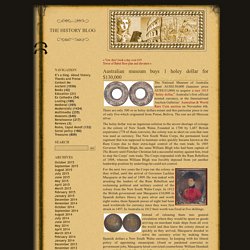
There are only 300 or so holey dollars extant and this particular piece is one of only five which originated from Potosi, Bolivia. The rest are all Mexican silver. The holey dollar was an ingenious solution to the severe shortage of coinage in the colony of New South Wales. Founded in 1788 by 1,487 British expatriates (778 of them convicts), the colony was so short on coin that rum was used as currency. The New South Wales Corps, the permanent local regiment that was supposed to maintain order, quickly became known as the Rum Corps due to their extra-legal control of the rum trade. The first great age of the book. Why are we so obsessed with the Tudors?
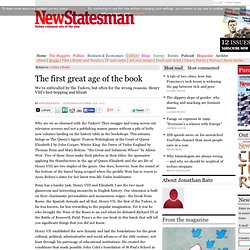
They swagger and romp across our television screens and not a publishing season passes without a pile of hefty new volumes landing on the history table in the bookshops. This autumn brings us The Queen's Agent: Francis Walsingham at the Court of Queen Elizabeth I by John Cooper, Winter King: the Dawn of Tudor England by Thomas Penn and Mary Boleyn: "the Great and Infamous Whore" by Alison Weir. The Industrial Revolution - Causes. All across England, the recent turn of the century has gone largely unnoticed.
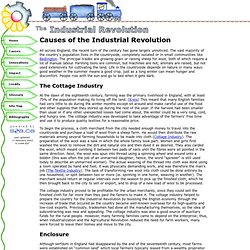
The vast majority of the country's population lives in the countryside, completely isolated or in small communities like Bedlington. The principal trades are growing grain or raising sheep for wool, both of which require a lot of manual labour. Farming tools are common, but machines are not; animals are raised, but not used extensively for cultivating the land. Life in the countryside depends on nature in many ways: good weather in the summer means a good crop, just as a long winter can mean hunger and discomfort. People rise with the sun and go to bed when it gets dark.
France. The course of industrialisation in France was so idiosyncratic that for a long time people wondered whether an industrial revolution had ever taken place in the country.
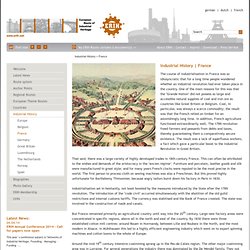
One of the main reasons for this was that the "Grande Nation" did not possess as large and accessible natural supplies of coal and iron ore as countries like Great Britain or Belgium. Coal, in particular, was always a scarce commodity; the result was that the French relied on timber for an astonishingly long time. In addition, French agriculture functioned extraordinarily well. The 1789 revolution freed farmers and peasants from debts and taxes, thereby guaranteeing them a comparatively secure existence. The result was a lack of superfluous workers, a fact which gave a particular boost to the Industrial Revolution in Great Britain. That said, there was a large variety of highly developed trades in 18th-century France. But France remained primarily an agricultural country until way into the 20th century. The East India Company Ltd – reborn and renewed. Linking a Nation: Chapter 1 - Australia and the Industrial Revolution in Transport and Communications.
Australia: Our national stories By Dr Robert Lee of the University of Western Sydney Australian Heritage Commission, 2003 Overland Telegraph pole, Hayes Creek NT.
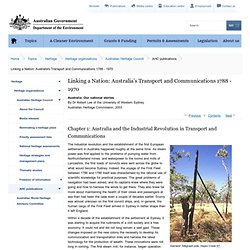
Photo: J McKinnon/Australian Heritage Photographic Library. Industry + Technology. Making the Modern World - Icons of Invention - Technology. The Collection. History In An Hour - history ebooks and history iPhone apps. History for busy people. SGA - mémoire des hommes - Fiche.
The Backlash Against "Immigrants" Is Offensive And Absurd. No Copyright Law: The Real Reason for Germany's Industrial Expansion? - SPIEGEL ONLINE - News - International. The entire country seemed to be obsessed with reading.

The sudden passion for books struck even booksellers as strange and in 1836 led literary critic Wolfgang Menzel to declare Germans "a people of poets and thinkers. " "That famous phrase is completely misconstrued," declares economic historian Eckhard Höffner, 44. "It refers not to literary greats such as Goethe and Schiller," he explains, "but to the fact that an incomparable mass of reading material was being produced in Germany.
" Höffner has researched that early heyday of printed material in Germany and reached a surprising conclusion -- unlike neighboring England and France, Germany experienced an unparalleled explosion of knowledge in the 19th century. German authors during this period wrote ceaselessly. The situation in England was very different. Equally Developed Industrial Nation Indeed, only 1,000 new works appeared annually in England at that time -- 10 times fewer than in Germany -- and this was not without consequences.